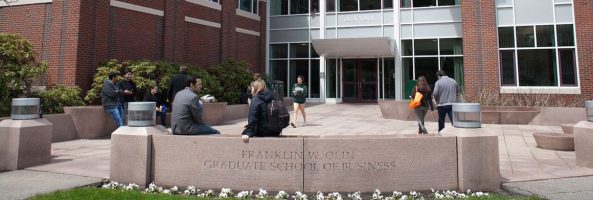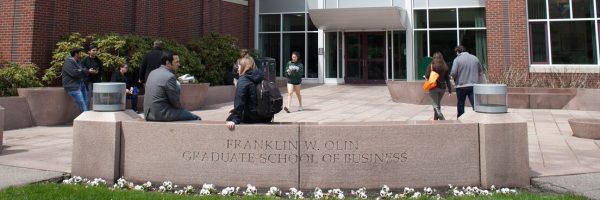Babson College Launches New MBA Program in Dubai

According to a recent Babson-sponsored report, Global Entrepreneurship Monitor (GEM), 88 percent of people in the United Arab Emirates (UAE) view entrepreneurs as having a high status in society, and 65 percent are confident in starting their own business. On the flip side, only 35 percent of U.A.E. professionals recognize good entrepreneurial opportunity around them, and 61 percent won’t start a business out of fear of failure. In addition, according to KPMG’s GCC Family Business Survey, 30 percent of family business leaders in the region are seeking opportunities to become more innovative, and 38 percent want to diversify their offerings.
It’s for these reasons and more that Babson College has decided to launch a new campus in Dubai, U.A.E. this year—starting in the fall. Babson College has been a world leader in entrepreneurship education for the last 25 years, with U.S. News & World Report ranking it No. 1 consecutively. Also, the Babson blended format MBA program has been ranked in the top 10 worldwide by the Financial Times.
Babson’s Dubai Education Programs
Babson’s expansion to Dubai will allow the school to offer graduate and executive education programs, including an MBA degree, to working professionals across the region. The format of those programs will include both in-class learning (face to face) as well as online learning and will launch this fall. Additional programs include a family entrepreneurship program as well as specialized open enrollment programs such as “Approaches to Innovation in the U.A.E.” as part of the Academy at DIFC.
Babson students will attend class at the Dubai International Financial Centre (DIFC), a leading financial hub for the Middle East, Africa, and South Asia. The building covers 272 acres and is already home to hundreds of leading financial and non-financial institutions, including several world banks, emerging fintech startups, wealth management firms, retailers, and more.
Some of the companies sharing space with Babson include:
- T. Kearney Middle East LLC
- Accenture Middle East B.V.
- Goldman Sachs International
- JPMorgan Chase Bank
- McKinsey & Company LME Limited

AFP PHOTO /KARIM SAHIB (Getty Images)
Babson Dubai MBA
As for the Babson Dubai MBA, it will take the blended learning format, which means classes will be held online using virtual collaboration as well as in-person sessions at the DIFC. This will allow for great flexibility for professionals all over the region.
When it comes to the coursework, the program has been designed explicitly for locally and regionally based individuals, notably Micro, Small, and Medium Enterprise (MSME) owners. There’s also an emphasis on education for family business leaders, corporate professionals, and individuals looking to advance their entrepreneurial learning. The core curriculum will focus on:
- Entrepreneurship and Opportunity
- International Macroeconomics and Business Environment Analysis
- Global Connections Through Technology
There will also be a few select topics specific to Dubai including Family Entrepreneurship, Entrepreneurial Finance, and M&A for Entrepreneurs.
To gain better insight into the new Babson Dubai location, we interviewed Babson College President Kerry Healey. Here’s what she had to say about the expansion.
MetroMBA: Why did Babson choose Dubai?
Kerry Healey: Dubai is the heart of the Babson community in the Middle East. It is home to our largest alumni and parent population in the region, and it’s an increasingly popular destination for our graduates. We also have a large alumni network throughout the MENASA region and an active Babson Middle East Alumni Club. In 2016, Babson hosted our annual entrepreneurship summit, Babson Connect: Worldwide, in Dubai. We were able to explore emerging entrepreneurship and business trends and the opportunities for entrepreneurship education in the region.
Beyond our Babson connections, research shows that there is a need for Babson’s transformative entrepreneurship offerings in the region, particularly among family business leaders. As the global leader in entrepreneurship education, with a unique focus on strengthening entrepreneurial families, Babson in Dubai seemed like a natural fit.
MetroMBA: How does the new location expand Babson’s offerings in new and exciting ways?
Kerry Healey: At Babson, our mission is to educate entrepreneurial leaders who create economic and social value—everywhere. We are working hard to make entrepreneurship education accessible to everyone, everywhere, and our presence in Dubai will provide students in the Middle East, Africa, South Asia, and India with more convenient access to a Babson education, and in particular our top-ranked blended learning MBA, which may not otherwise be an option due to visa restrictions.
We also plan to offer specialized open enrollment programs through Babson Executive and Enterprise Education, beginning this fall with “Approaches to Innovation in the U.A.E.” And, we hope to work closely with organizations in the region to develop custom programs that address specific business goals and objectives.
MetroMBA: What can Dubai students expect?
Kerry Healey: We are excited to offer programming at the Academy at DIFC, in the region’s leading center of finance and enterprise. The Babson MBA-Dubai, which combines online classes and virtual collaboration with face-to-face sessions at the DIFC, will offer a powerful yet flexible learning experience to prepare entrepreneurs of all kinds to fuel future innovation. The program has been designed specifically for locally and regionally based working professionals, and its unique design combines core business and entrepreneurship curriculum with special topics specific to the Dubai program.
Courses will be taught by our renowned Babson faculty, who are accomplished practitioners and researchers dedicated to student success. Perhaps most important, our cohort-based program creates a tight-knit community of students that will continue to collaborate and innovate well beyond the completion of their studies.
To learn more about the new Dubai programs from Babson College, you can read the full press release here.
MIT Hackathon Yields Planned Parenthood for Substance Abuse – Boston News

Let’s explore some of the most interesting stories that have emerged from Boston business schools this week.
Planned Parenthood for Substance Abuse Idea Wins MIT Enterprise Management Lab Hackathon – MIT Sloan Newsroom
MIT Sloan’s 2018 Enterprise Management Lab hackathon recently came and went. This year’s winning concept applied Planned Parenthood’s business model to substance abuse in an attempt to creatively address the ongoing American opioid crisis.
The idea extended substance treatment to include support for friends and family and offer “a one-stop shop for information” to “government entities, nonprofits, hospitals, and rehab clinics.” Kyle R. Chapman, MBA ’19, and member of the winning team, writes:
“We knew a lot of people would try to solve the problem by going upstream. A smart pillbox might address part of the opioid crisis, but the problem is that’s only attacking one point of a really systemic problem.”
Learn more about this year’s hackathon winner here.
Trending Topics in Marketing and Media – Sawyer Business Blog
Sawyer Business School at Suffolk University recently recapped its recent Bridging the Gap seminar, which offered a platform for Boston marketing and media pros to highlight a number of key industry issues for students, including the impact of data privacy on digital advertising; voice-activated devices; and strategies for building brands in the modern era.
Ereni Markos, associate professor of marketing and co-organizer of the event, writes:
“It’s especially important for all of us in the Marketing Department to bring real-world expertise to the Suffolk community and, in turn, for us to share our thinking from the classroom and working with students. Networking is crucial for students to build their professional network early on in their careers.”
You can read more about the seminar here.
Lessons from Tim Ryan ’88 of PwC – Babson Blog
Babson College recently hosted a guest lecture from Senior Partner and Chairman of PwC US Tim Ryan ‘88, who used his talk to highlight three key bits of advice that touched upon respect, reputation, and recognition. He also spoke extensively with the Babson blog after his appearance about what diversity and inclusion means to him.
“If we don’t truly understand one another, we’ll never be the most inclusive workplace in the world. Outside of family, work is where we spend the most amount of our time. It was a catalytic moment, after over a decade of investing in programs, trainings, studies, and testing, when we realized that the baseline of talking and communicating was missed.”
Read more from Babson’s talk with Tim Ryan here.
What are the Fastest MBA Programs in Boston?

Some students want to complete their MBA coursework as quickly and efficiently as possible—time is money after all! Continue reading…
Babson Entrepreneurship Stays at #1 for 25 Consecutive Years

For the 25th year in a row, U.S. News & World Report ranked Babson College’s F.W. Olin Graduate School of Business as the number one program for entrepreneurship in the United States. Entrepreneurship is an indelible part of the business school and MBA program, found within the curriculum, faculty, clubs, centers, and more.
Babson’s Entrepreneurship Curriculum
At Babson, the 50-plus faculty members and 30 adjunct entrepreneurs—the largest dedicated entrepreneurship faculty in the world—come together to teach Entrepreneurial Thought & Action®. This methodology is a way to balance action, experimentation, and creativity with business fundamentals. The goal is to empower students to take action on social, economic, and environmental issues to create value. Students are taught to apply ET&A™ in everything from large corporations to running a charity, solving social issues, and starting a business.
In addition, at Babson, there’s the idea that “we are all entrepreneurs,” which falls under the Entrepreneurship of All Kinds® heading. This concept re-imagines entrepreneurship to include all brilliant improvisers, not just startups, venture capital firms, and business incubators. It looks at how every organization can use entrepreneurship to creatively solve problems and adapt to change.
Both ET&ATM and Entrepreneurship of All Kinds® are interwoven into the very fabric of Babson, being taught in every classroom and every topic.
Babson’s Entrepreneurship Focus
Outside of the curriculum and academic philosophy of Babson, entrepreneurship can be found in dedicated centers and other resources. For example, the school is home to the Arthur M. Blank Center for Entrepreneurship, which helps to accelerate the practice of entrepreneurship through mentoring, competitions, events, workshops, and more. This Center is the hub of the entrepreneurial ecosystem.
There’s also the John E. and Alice L. Butler Launch Pad, which hosts two signature entrepreneurship events every year: the Rocket Pitch and B.E.T.A. Challenge both of which bring together students and alumni to compete in business innovation. The Launch Pad is also responsible for the Summer Venture Program, which accelerates the top 15 student ventures at Babson each year.
To gain more in-depth insight into Babson’s entrepreneurial focus, we had the opportunity to interview Keith Rollag, the Dean-Elect of the Graduate School (starting July 1). He was able to talk to us about how Babson has been able to stay as the number one program for entrepreneurship for 25 years as well as what that looks like at the university.
-
How has the Babson MBA managed to maintain the #1 entrepreneurial slot for so long?
There are several reasons; some of it comes from our first-mover advantage. We taught our first course in entrepreneurship in 1967, and created the Center for Entrepreneurial Studies in the 1970’s at a time when entrepreneurship wasn’t really accepted as a separate business discipline. We started the Babson Entrepreneurship Research Conference in 1981 (which continues to be one of the premier conferences for entrepreneurship) and the Price-Babson Symposium for Entrepreneurship Education in 1984, which over the years has taught almost 5000 educators from over 1000 institutions and 80-plus countries how to teach entrepreneurship.
But our #1 ranking is also due to the creation of a Babson community, culture, and curriculum that is built around entrepreneurship. Entrepreneurship has been an important part of our curriculum since the 1980’s, and we’ve built what we think is the largest entrepreneurship department in the world with over 50 full-time and adjunct faculty members.
Entrepreneurship has been a part of our Babson DNA for decades, and we live it as well as teach it. We are constantly updating our curricula, trying new things, building new partnerships, and exploring new opportunities. The term Entrepreneurial Thought and Action is the latest embodiment of this spirit, and it aptly implies the energy and enthusiasm that is an integral part of Babson.
-
Why do you feel that Entrepreneurial Thought & Action is vital to an MBA education?
At its core, Entrepreneurial Thought and Action is all about rapid learning, and in today’s dynamic world of uncertainty, whoever learns fastest wins. We teach our students to know when to learn quickly through analyzing, strategizing, and planning, and when to learn quickly through prototyping, experimenting, interacting with customers. Both are critical for success, but our education and reward systems tend to favor thinking and discussing over acting. We know from the habits of successful entrepreneurs that in times of high uncertainty, action (and the learning that comes from it) is the best way to solve problems and take advantage of emerging opportunities.
In our Babson MBA programs, we help students develop both a mindset and habit of learning through action. This is valuable whether you are trying to lead innovation within large corporations, grow and expand small and medium-size businesses, create new ventures, or simply find new ways to address complex-but-important problems facing communities, regions, and the world.
Learning quickly is a skill that will always be valued by organizations. While markets, technologies, structures, and roles may change, the need for a manager to learn quickly will never go away.
-
What aspect of your entrepreneurship studies/opportunities/focuses would you like to highlight?
We do many things under the broad heading of “entrepreneurship of all kinds.” Students have the opportunity to participate in intensity tracks around entrepreneurship (where they can build their venture while they are getting an MBA), women-led entrepreneurship, social innovation, and technology development. We also have the Butler Launch Pad as well as our highly competitive Summer Venture Program that helps start dozens of ventures (both business and social-focused). And our MBA students have several clubs focused on regional entrepreneurship and host well-attended conferences on United States, Asian, Indian, and Latin American entrepreneurship.
Whether one is considering starting a company or looking to lead ventures within larger organizations, or just wanting to maximize their impact on the world, an entrepreneurial, can-do, action-oriented mindset primes everyone for success.
Babson Reveals New Scholarships, Rankings, for Blended Learning MBA

What if you could earn your MBA with minimal time in the classroom? That’s precisely what the Blended Learning MBA program at Babson College’s F.W. Olin Graduate School of Business offers. It’s a unique MBA program that combines online classes with face-to-face instruction to provide students with flexible scheduling and the ability to continue working full-time. Continue reading…
Searching for the Perfect 1-Year MBA in Boston

Not everyone has two years to dedicate toward earning an MBA. For some, maybe a year is just a better option. Luckily, Boston has more than enough options for those who would rather trek down the one-year path.
Currently, Boston is the 20th most populous city in the U.S., with its historical roots grounded in advanced academia. It has proven to be a perfect home for students, with a population that skews young. Almost one out of every three residents is between the ages of 20 and 34.
The largest employers might be hospitals like Brigham & Women’s Hospital or Massachusetts General Hospital, but the coastal city’s true jewels are its universities like Harvard and MIT. While most schools in the area offer MBA programs, not all offer options that’ll allow students to graduate with an MBA within one year. Below, we outlined some of the best Boston 1 Year MBA program opportunities.
F.W. Olin Graduate School of Business — Babson College
The F.W. Olin Graduate School of Business isn’t too old; it’s been around since 1947. Students can take its one-year MBA program on its main campus in Wellesley, Massachusetts. It’s about 14 miles away from Boston, so students will still be just a short drive away.
The program takes 12 months, but students can build close bonds with each other in this short period of time. This program’s participants operate as a cohort, but they also get the chance to mingle with some students in the school’s two-year and evening MBA programs. All MBA candidates have the opportunity to participate in Signature Learning Experiences, a hands-on approach to education that prepares students for real-world situations.
Sawyer Business School — Suffolk University
The Sawyer Business School isn’t as old as the university, but that hasn’t stopped it from getting recognized. The school began to offer an MBA in 1948 and never quite began to offer a formal one-year MBA program, but it does offer accelerated ones.
Sawyer has a couple accelerated MBA programs: one for attorneys and for certified public accountants. The way it works is that students enter the program with credits already under their wing. The catch is that students complete a certain number of credits in the business school—but these could have been before chasing an MBA. It all really depends. That’s 37 credits for attorneys; 34 for CPAs.
MBA candidates with an interest in law can also learn a concentration while at the school. Courses include an immersive, travel seminar. As for CPA candidates, their curriculum is nearly identical to the attorney pathway. The only difference is one class required for the attorney curriculum and not the CPA: Corporate Financial Reporting and Control.
Sloan School of Management — MIT
MIT may mostly be known for tech industry and Good Will Hunting scenes, but its Sloan School of Management is frequently ranked as one of the best in the world by esteemed publications like The Economist. While Sloan doesn’t exactly offer a one-year MBA, its MIT Sloan Fellows Program only takes one year—and fellows walk away with an MBA.
The school calls the program a “change-the-world toolkit.” Mid-career managers from around the world are invited to apply for the fellowship. Once accepted, fellows arrive in April and begin their journey together. They take summer courses, fall courses, and some during the spring too. There’s an optional independent activities period where fellows can take part in a four-week term made up of how-to sessions, forums, or tours for 12 credits max.
